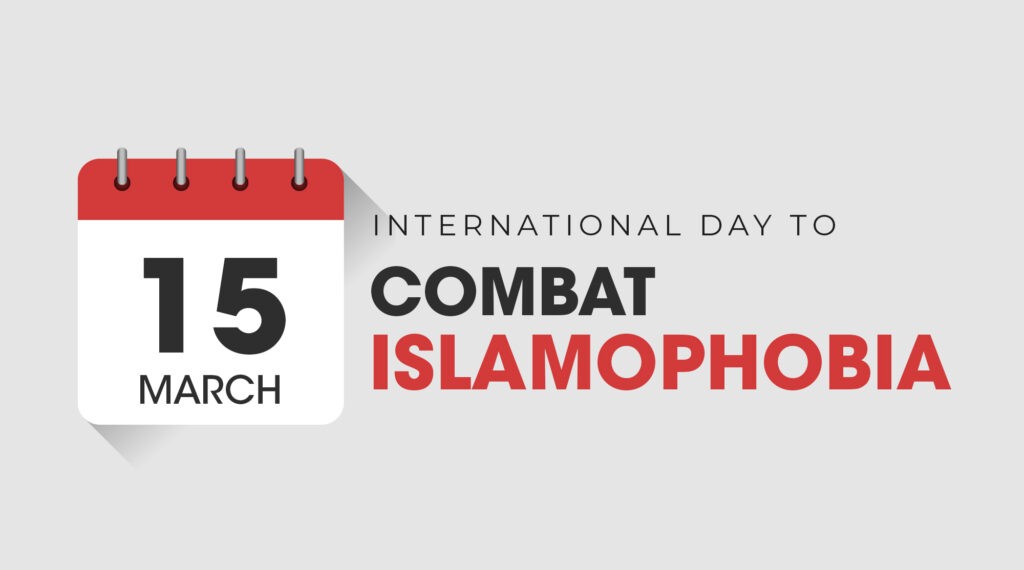March 15- International Day to Combat Islamophobia

- Taking note of the statement entitled “A call for mutual respect” by the High Representative of the United Nations Alliance of Civilizations,
- Recalling all the heinous and cowardly terrorist attacks and acts of violence, incitement to violence, and discrimination against people of all religions or beliefs, including Muslims, in various parts of the world, and expressing deep condolences to the families of the victims and appreciation for the sympathetic response of several Governments, communities and civil society organizations, … ]UN General Assembly[ …decides to proclaim 15 March the International Day to Combat Islamophobia.
The quoted paragraphs are part of resolution 76/254 adopted by the General Assembly on 15 March 2022, serving as the approving document for this day.
What is Islamophobia?
Islamophobia is a fear, prejudice, and hatred of Muslims that leads to provocation, hostility, and intolerance by means of threatening, harassment, abuse, incitement, and intimidation of Muslims and non-Muslims, both in the online and offline world. Motivated by institutional, ideological, political, and religious hostility that transcends into structural and cultural racism, it targets the symbols and markers of being a Muslim.
This definition emphasizes the link between institutional levels of Islamophobia and manifestations of such attitudes, triggered by the visibility of the victim’s perceived Muslim identity. This approach also interprets Islamophobia as a form of racism, whereby Islamic religion, tradition, and culture are seen as a ‘threat’ to Western values.
A rising tide of anti-Muslim hate
UN Secretary-General António Guterres has repeatedly condemned the continuing acts of anti-Muslim hatred and bigotry around the world, warning on several occasions that this worrying trend targets not only Muslims but also Jews, minority Christian communities, and others.
In his message for the International Day to Combat Islamophobia, Guterres warns that Muslims face institutional discrimination, barriers, and violations of their human rights and dignity. “Divisive rhetoric and misrepresentation are stigmatizing communities. Online hate speech is fueling real-life violence”, he added.
Hate speech and violence online and offline!
The UN Human Rights Chief also voiced his alarm over the rise in global hatred, including anti-Semitism and Islamophobia, since the beginning of the Israeli military operation in Gaza (7 October) in response to the attack on Israel by Palestinian armed groups.
Volker Türk strongly condemned the sharp rise in cases of hate speech, violence, and discrimination, both online and offline. He emphasized that states must ensure a safe and enabling space for participation and debate, consistent with the International Covenant on Civil and Political Rights (ICCPR).
Lack of policies to promote diversity
States have a responsibility to address any hatred based on religion or belief in a manner that complies with human rights, recalls the UN Special Rapporteur on freedom of religion or belief, Nazila Ghane, in her last report on Hatred on the basis of religion or belief.
The expert stresses that advocacy of religious hatred that leads to discrimination, hostility or violence should be prohibited by law. While international norms and standards provide a framework to combat incitement to discrimination and violence, laws are not enough, and States should also adopt policies and programs that promote diversity and freedom of expression, especially in multicultural and interconnected societies, proposed Ghane.
Another report by the former UN Special Rapporteur on freedom of religion or belief, Ahmed Shaheed, found that suspicion, discrimination, and outright hatred towards Muslims had risen to ‘epidemic proportions’ following the terrorist attacks of 11 September 2001 and other horrific acts of terrorism purportedly carried out in the name of Islam.
Combating Islamophobia
Many Governments have taken steps to combat Islamophobia by establishing anti-hate-crime legislation and measures to prevent and prosecute hate crimes, and by conducting public awareness campaigns about Muslims and Islam designed to dispel negative myths and misconceptions.
The NU General Assembly adopted a resolution sponsored by 60 Member-States of the Organization of Islamic Cooperation (OIC), which designated 15 March as the International Day to Combat Islamophobia. The document stresses that terrorism and violent extremism cannot and should not be associated with any religion, nationality, civilization, or ethnic group. It calls for a global dialogue on promoting a culture of tolerance and peace, based on respect for human rights and the diversity of religions and beliefs.
Guidelines for Educators on Countering Intolerance and Discrimination against Muslims
The 68-page handbook is available here. These guidelines were jointly developed by the OSCE Office for Democratic Institutions and Human Rights (ODIHR), the Council of Europe, and UNESCO.

Leave a Comment:
You must be logged in to post a comment.